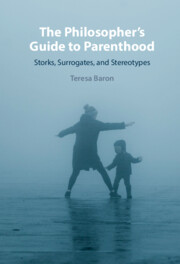Book contents
- The Philosopher’s Guide to Parenthood
- The Philosopher’s Guide to Parenthood
- Copyright page
- Dedication
- Contents
- Acknowledgements
- Introduction
- Chapter 1 Babies, Blueprints, and Blood Ties
- Chapter 2 Social Roles, Stereotypes, and Being ‘Seen’ as a Parent
- Chapter 3 ‘Do You Have a Licence for That?’ Legal Parenthood and Transfers of Children
- Chapter 4 Duties, Dilemmas, and (Re)distribution
- Chapter 5 Paradigms and Parental Projects
- Conclusion
- Bibliography
- Index
Chapter 4 - Duties, Dilemmas, and (Re)distribution
Moral Perspectives on Parenthood
Published online by Cambridge University Press: 15 January 2023
- The Philosopher’s Guide to Parenthood
- The Philosopher’s Guide to Parenthood
- Copyright page
- Dedication
- Contents
- Acknowledgements
- Introduction
- Chapter 1 Babies, Blueprints, and Blood Ties
- Chapter 2 Social Roles, Stereotypes, and Being ‘Seen’ as a Parent
- Chapter 3 ‘Do You Have a Licence for That?’ Legal Parenthood and Transfers of Children
- Chapter 4 Duties, Dilemmas, and (Re)distribution
- Chapter 5 Paradigms and Parental Projects
- Conclusion
- Bibliography
- Index
Summary
This chapter begins with a discussion of the common methodologies, starting assumptions, and key aims that shape philosophical work in this sphere. This part of the chapter aims to lay bare the bones of philosophy of parenthood as this field currently stands, providing a critical tool for investigation of existing theories of parenthood, but also further demonstrating the complex interdependence between moral parenthood and the concepts of parenthood covered in the previous chapters. I then give an overview of the approaches philosophers have taken to defining the grounds of moral parenthood, and the different problem cases motivating these accounts. Whilst all these problem cases deviate from the ‘paradigm’ case – in which biological, social, legal, and moral parenthood neatly coincide – literature on parental obligations tends to focus on situations in which candidate parents are disinclined to take on some form of parenting role. Philosophers focusing on parental rights, on the other hand, have often been concerned with an overabundance of candidate parents and have aimed to provide solutions to potential disputes. These disputes might arise between parties to surrogacy agreements, biological parents and step- or adoptive parents; and, more speculatively, between biological parents and the hypothetical ‘best available parents’.
Keywords
- Type
- Chapter
- Information
- The Philosopher's Guide to ParenthoodStorks, Surrogates, and Stereotypes, pp. 128 - 163Publisher: Cambridge University PressPrint publication year: 2023

